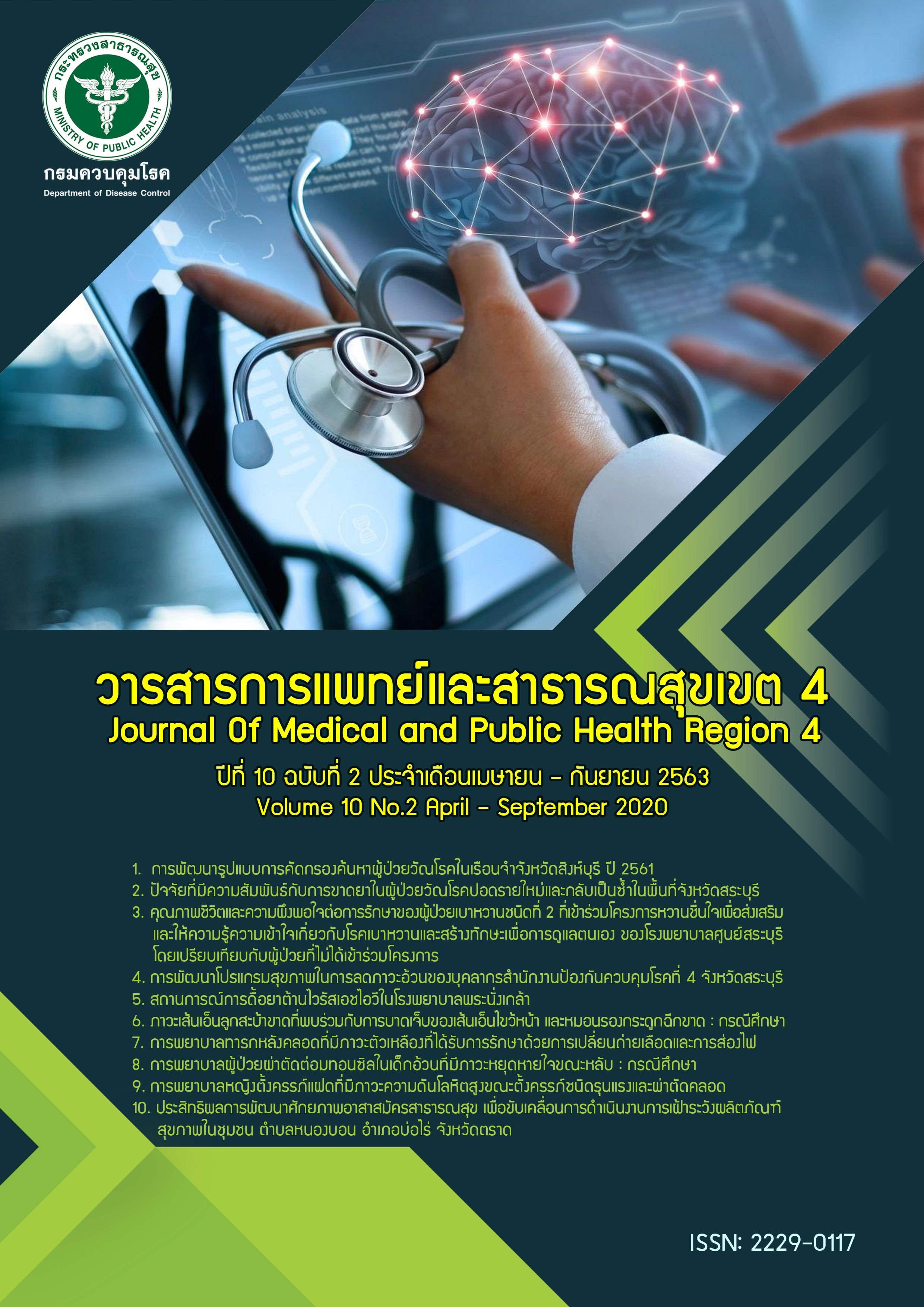Comparing the quality of life and satisfaction with treatment of type 2 diabetes of patients who participated in the Waan Chean Jai which is self-management education and support program of the Saraburi Hospital with type 2 diabetes of patients who did not participate in the project
Main Article Content
Abstract
The objective of this research was to study the quality of life and satisfaction with treatment of type 2 diabetes of patients who participated in the Waan Chean Jai which is self-management education and support project of the Saraburi Hospital comparing with type 2 diabetes of patients who did not participate in the project. The research model was a cross-sectional analytical study by using the sample groups 206 persons which can be divided into 2 groups as follows: 1.Participated program at least 3 months 2.Not participated pagram. The used instruments were Audit of Diabetes Dependent Quality of Life 19 (ADDQoL19) and Diabetes Treatment Satisfaction Questionnaire (DTSQ). The finding revealed that type 2 diabetes of patients who participated in the Waan Chean Jai which is self-management education and support project of the Saraburi Hospital had the average blood sugar level after fasting for 8 hours (FBS), the cumulative average of the sugar backward (HbA1C) accumulated were at a higher level more than patients who did not participate in the project at a statistically significant with a P-Value <0.001 and <0.001 respectively. In addition, patients who participated in the project had a higher level of the mean and average quality of life than patients who did not participated in the program(p<0.001) and found that the overall satisfaction from treatment was higher than patients who did not participate in the activity at a statistically significant with a P-Value of less 0.001 Therefore, doctors and the related personnel should educate people with diabetes and strengthen their diabetes care skills in combination with general diabetes treatment so that patients can control their blood sugar levels according to their goals and enhance the quality of life, including satisfaction with existing diabetes treatment and reducing future in current disease of patients.
Article Details
References
2. สมาคมโรคเบาหวานแห่งประเทศไทย. แนวทางเวชปฏิบัติสำหรับโรคเบาหวาน. [บทความ].2560. [เข้าถึงเมื่อ 12 มีนาคม 2562]: เข้าถึงได้จาก:https://www.dmthai.org/index.php/knowledge/healthcare-providers/cpg/810-diabetes-care-2019
3. Brunisholz KD, Briot P, Hamilton S, et al. Diabetes self-management education improves quality of care and clinical outcomes determined by a diabetes bundle measure. J Multidiscip Healthc 2014;7:533–542.
4. Cochran J, Conn VS. Meta-analysis of quality of life outcomes following diabetes self-management training. Diabetes Educ. 2008; 34 (5):815–23.
5. H wee W. Health-related quality of life in people with diabetes mellitus perspective from a multi-ethnic asian population [In PhD Thesis] Singapore: National University of Singapore; 2005.
6. Bradley, C. Todd, C. Gorton, T. Symonds, E. Martin, A. Plowright, R. The development of an individualised questionnaire measure of perceived impact of diabetes on quality of life: The ADDQoL. Qual. Life Res. 1999; 8(1-2): 79–91.
7. Bradley, C. Diabetes Treatment Satisfaction Questionnaire (DTSQ). In Handbook of Psychology and Diabetes: A Guide to Psychological Measurement in Diabetes Research and Practice, Bradley, editors. C. New York: Harwood Academic Publishers; 1994. p.111-112.
8. Stone DB. A study of the incidence and course of poor control in patient with diabetes
mellitus. Am J Med Sci.1961;24:436-444.
9. Rusdiana, Savira M, Amelia R. The effect of diabetes self-management education on Hba1c level and fasting blood sugar in type 2 diabetes mellitus patients in primary health care in binjai city of north Sumatera, Indonesia. Open Access Maced J Med Sci. 2018;6(4):715–8.
10. Cunningham AT, Crittendon DR, White N, Mills GD, Diaz V, Lanoue MD. The effect of diabetes self-management education on HbA1c and quality of life in African-Americans: A systematic review and meta-analysis. BMC Health Serv Res. 2018;18(1).
11. Kargar Jahromi M, Ramezanli S, Taheri L. Effectiveness of diabetes self-management education on quality of life in diabetic elderly females. Glob J Health Sci. 2015;7(1):10–5.


